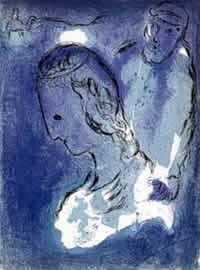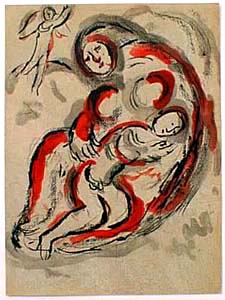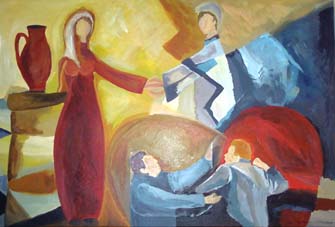I Must Keep Going:
Lent's Unfinished Business
For Sunday March 4, 2007
Second Sunday in Lent
Lectionary Readings (Revised Common Lectionary, Year C)
Genesis 15:1–12, 17–18
Psalm 27
Philippians 3:17–4:1
Luke 13:31–35 or Luke 9:28–36
 |
Anna Nicole Smith and son Daniel. |
Last summer as I walked down University Avenue in Palo Alto, I noticed the tee-shirt of a woman who passed me on the sidewalk. Bold letters across the front of her shirt proclaimed, "I've Got Issues!" I laughed to myself at how her message captured the spirit of our therapeutic age, perhaps simultaneously mocking it, and at the exhibitionist verve of announcing so publicly the stuff of such privacy. We live in an age, after all, when Dr. Phil makes mega-millions peddling psycho-voyeurism as therapy, and when the media exploits Anna Nicole Smith's tragic death just as it did her troubled life (God's peace to you, Anna Nicole).
The more I've thought about the three words on that tee-shirt, the more I'm convinced that they summarize the Lenten message. Since the fourth century the followers of Jesus have given themselves to sustained reflection on their "issues" at this time of the liturgical year, and so we've set aside the 40 week days before Easter to contemplate our mortality, our faults and our failures. Unfortunately, in the popular imagination, and undoubtedly in some people's practices, Lent has earned a reputation for moralistic, morbid and gloomy introspection. I'm such a worm! On Ash Wednesday some believers smeared ashes on their forehead. Others fast, or at least try to. Still others muster the gumption to perform acts of mercy, abstinence, or contrition. And hey, if I'm going to give up chocolate or alcohol for six weeks, better to party hard on fat Tuesday (Mardi Gras).
 |
Abraham and Sarah, by Marc Chagall, 1956. |
Instead of a prolonged period of misanthropy, I've come to understand Lent as a season of liberation. At their best, our outward Lenten acts bespeak an inward disposition. In the language of the sacraments, they are visible signs of an invisible grace. In a culture that celebrates indulgence, entitlement, winning at any cost, hubris and bravado, Lent signals a wonderfully and outrageously counter-cultural enactment of loss and humility. Lent frees us to unmask the many faces of denial about our "stuff." We're encouraged to befriend our brokenness, acknowledge that not all is well with our souls, and identify with the hurt of so many people in our world. During Lent we exchange the oppressive fantasy of perfection for the liberating reality of fallibility, and, in a miracle of grace, discover that there are consolations in imperfections. Finally, Lent reminds us that sooner or later the dance will end: “Remember, O man, that you are but dust, and to dust you shall return” (Genesis 3:19).
Consider the lives of two deeply flawed saints in this week's readings.
Hearing the call of God at the age of seventy-five, Abraham left all that he knew and loved in Ur of the Chaldees, all that was familiar and friendly. He journeyed from what is now Nasiriyah, Iraq in ignorance, "not knowing where he was going" (Hebrews 11:8), and so later writers described him as a "wandering Aramean" (Deuteronomy 26:5). Famine drove him down to Egypt, where lies and deceit saved not only his marriage but probably his life. Upon returning from Egypt family quarrels erupted over money, inheritance rights, and children. There followed the drama of rescuing his nephew Lot. Infertility led to sex for hire with Hagar, Sarah's Egyptian maidservant. Even Abraham's religious rituals were marked by "a thick and dreadful darkness" (Genesis 15:12). After Hagar was banished and Sarah died, Abraham took a third wife, Keturah, with whom he fathered six more children. Then Abraham died, just like each one of us will, and the Sciptures note that he died "without having received the promise" (Hebrews 11:13). In the words of Edwin Muir's poem Abraham, "The Promise had not come, and he left his bones, / Far from his father's house, in alien Canaan." With the stuff of his human life unfinished and the divine promises unfulfilled, Abraham became "the father of us all" (Romans 4:16) in more ways than one.
 |
Hagar in the Desert, by Marc Chagall, 1960. |
Writing to his friends in Philippi from a Roman jail, Paul admits that self-confident, religious perfectionism once ruled his life. Eventually he understood his zeal for a faultless life for what it was, an exercise in pride, futility and delusion. Later he reversed course, repudiated his quest for religion based upon insider-ethnicity, rule-keeping, sanctimony, and the fantasy of perfection, and forfeited his self-righteousness. Rather, he wrote the Philippians, he wanted to know Christ, the power of his resurrection, and the fellowship of his sufferings. But his actual experience fell far short of this new longing: "not that I have already obtained all this, or have already been made perfect, but I press on, [even though] I do not consider myself yet to have taken hold of it" (Philippians 3:12–13). Especially his "lowly body," as he called it, had to wait for a full and final transformation.
Abraham and Paul remind me that while some of my faults, failures, and brokenness—my "issues," if you will—might enjoy limited healing in this life, I will carry many if not most of them all the way to the grave. The desert monastics of fourth-century Egypt recommended the sage advice of Saint Anthony the Great (251–356), that we should "expect trials until your last breath." In modern parlance, "until the day you die you will have issues."
 |
Hagar, Sarah, and Keturah. |
This diagnosis does not consign us to chronic pessimism, but rather to human realism, and to our future eschatological hope, for Lent is only a penultimate stop on the journey; Easter resurrection is our ultimate destination. Although he died "far from his father's house, in alien Canaan," Abraham persisted in faith, like a resident alien in a foreign country. His journey's end was not an earthly destination but "a city with foundations, whose architect and builder is God. . . He was longing for a better country—a heavenly one" (Hebrews 11:10, 16). Reflecting upon his limited spiritual progress and his certain physical deterioration, Paul wrote that our final "citizenship is in heaven" (Philippians 3:20). And in the Gospel for this week, Jesus assured his followers that no death threats from Herod Antipas would shorten his work. He would preach, teach, and heal until Gethsemane and Golgotha: "In any case, I must keep going today and tomorrow and the next day" (13:31, 33). The via dolorosa is not an easy journey, but its destination is sure, so this Lenten season let us with Abraham, Paul and Jesus keep going today, tomorrow, and the next day, until we reach Easter.
For further reflection
* What does Donald McCullough mean when he writes of the "consolations of imperfections?"
* What might it mean to live and die "without having received the promise?"
* Why do you think so many people watch Dr. Phil?
* Meditate on the implications that Abraham journeyed "not knowing where he was going" (Hebrews 11:8).
* See Brennan Manning, The Ragamuffin Gospel.





